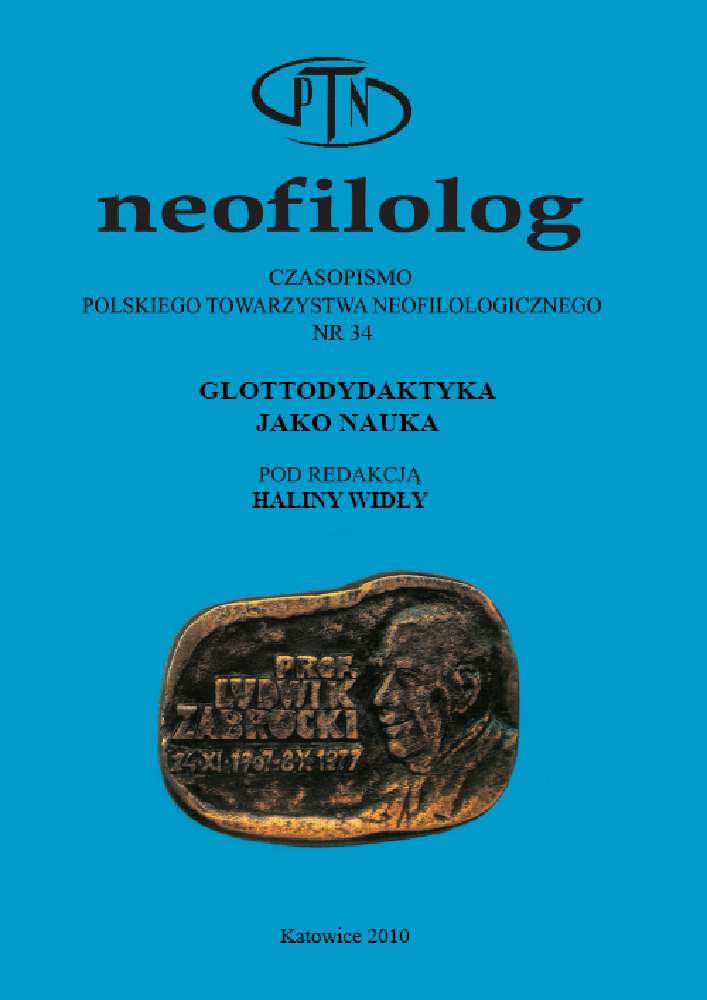Abstrakt
My thesis in this article is that developing glottodidactics as an academic discipline is an optimal program for the field of foreign language learning and teaching, especially considering its prospects of generating practically useful knowledge. I begin by making distinctions between ‘practice’, ‘theory’, and ‘science’ in the context of three stages in the maturation of our field. This is to show the qualitative differences between a) commonsense b) methodology, and c) an academic discipline with the prospect of satisfying social demands for knowledge which is useful in teaching, understood as its own application. Chances of this full-fledged discipline generating such knowledge, however, depend on its success in constituting itself as mirror image of an empirical discipline with an empirical system as its subject matter.
Bibliografia
Byram, W. (red.), 2004. Routledge Encyclopedia of Language Teaching and Learning. London: Routledge.
Crookes, G., 1992. Theory format and SLA theory. Studies in Second Language Acquisition 14, 425 – 449.
Crookes, G., 1997. SLA and language pedagogy. A socioeducational perspective. Studies in Second Language Acquisition 19, 93 – 116.
Dakowska, M., 1987. Funkcje lingwistyki w modelach i procesach glottodydaktycznych. Warszawa: PWN.
Dakowska, M., 1996. Models of Language Use and Language Learning in the Theory of Foreign Language Didactics. Franfurt am Main: Peter Lang.
Dakowska, M., 2000, Mechanizm czy organizm? Dwa bieguny modelowania akwizycji języków obcych. W: B. Kielar, J. Lewandowski, J. Lukszyn i T.P. Krzeszowski (red.), Problemy komunikacji międzykulturowej. Warszawa: Grafpunkt, 335 – 351.
Dakowska, M., 2003, Current Controversies in Foreign Language Didactics. Warszawa: Wydawnictwa Uniwersytetu Warszawskiego.
Dornyei, Z., 2009. The Psycholog y of Second Language Acquisition.Oxford: Oxford University Press.
Gregg, K., 1993. Taking explanation seriously; or, Let a couple of flowers bloom. Applied Linguistics 14, 3, 276 – 294.
Gregg, K., 2003. “SLA Theory: Construction and Assessment.” W: C.J. Doughty and M.H. Long (red.), The Handbook of Second Language Acquisition. Malden: Blackwell, 831 – 866.
Grucza, F., 1974. Lingwistyka a glottodydaktyka. Języki Obce w Szkole 3, 133 – 143.
Grucza, F., 1976. Lingwistyczne uwarunkowania glottodydaktyki. W: F. Grucza, (red.) Glottodydaktyka a lingwistyka. Warszawa: Wydawnictwa Uniwersytetu Warszawskiego, 7 – 25.
Grucza, F., 1983. Zagadnienia metalingwistyki. Lingwistyka – jej przedmiot, lingwistyka stosowana. Warszawa: PWN.
Johnson, M., 2004. A Philosophy of Second Language Acquisition. New Haven: Yale University Press.
Jordan, G., 2004. Theory Construction in Second Language Acquisition. Amsterdam: Benjamins.
Jupp, V., (red.), 2006. The Sage Dictionary of Social Research Methods. London: Sage.
Kaplan (red.), The Oxford Handbook of Applied Linguistics. Oxford: Oxford University Press.
Kumaravadivelu, B., 2003. Beyond Methods. Macrostrategies in Language Teaching. New Haven: Yale University Press.
Kumaravadivelu, B., 2006. Understanding Language Teaching. From Method to Post-Method. Mahwah: Lawrence Erlbaum.
Larsen-Freeman, D., 1997. Chaos/complexity science and second language acquisition. Applied Linguistics 18,2, 141 – 165.
Larsen-Freeman, D., L. Cameron, 2008. Complex Systems and Applied Linguistics. Oxford: Oxford University Press.
Long, M., 1993. Assessment strategies for SLA theories. Applied Linguistics 14, 225 – 249.
Long, M. 2004. Acquisition and teaching. W: M. Byram (red.), 4 – 5.
Long, M. H., 2004. “Second language acquisition theories.” W: Byram (red.), 527 – 534.
Long, M., 2007. Problems in SLA. Mahwah, N.J.: Lawrence Erlbaum Ass.
Mitchell, R., F. Myles, 1998. Second Language Learning Theories. London: Arnold
Richards, J.C., T.S. Rodgers, 2001. Approaches and Methods in Language Teaching. Cambridge: CUP.
Ritchie, W. C., i T. K. Bhatia (red.), Handbook of Second Language Acquisition. San Diego: Academic Press.
Swan, M., 2005. Legislation by hypothesis: The case of Task-Based Instruction. Applied Linguistics 26/3, 376 – 401.
Van Patten, B., J. Williams (red.), Theories in Second Language Acquisition. An Introduction. Mahwah, NJ: Lawrence Erlbaum.
Widowson, H., 2003. Defining Issues in English Language Teaching. Oxford: Oxford University Press.
Licencja
Prawa autorskie (c) 2010 Maria Dakowska

Utwór dostępny jest na licencji Creative Commons Uznanie autorstwa – Bez utworów zależnych 4.0 Międzynarodowe.
Przedstawiany utwór (artykuł) upubliczniany jest na podstawie umowy z autorem i na licencji Creative Commons Attribution-NoDerivatives 4.0 International (CC BY-ND 4.0).
Użytkownicy mają obowiązek podania wraz z rozpowszechnionym utworem, informacji o autorstwie, tytule, źródle (odnośniki do oryginalnego utworu, DOI) oraz samej licencji;
- bez tworzenia utworów zależnych,
- utwór musi być zachowany w oryginalnej postaci.
Uniwersytet im. Adama Mickiewicza w Poznaniu zachowuje prawo do czasopisma jako całości (układ, forma graficzna, tytuł, projekt okładki, logo itp.).
